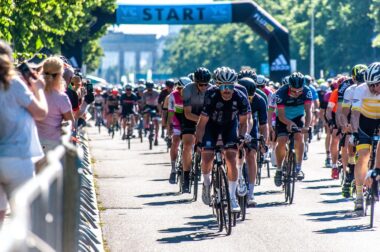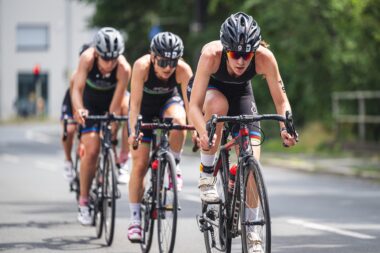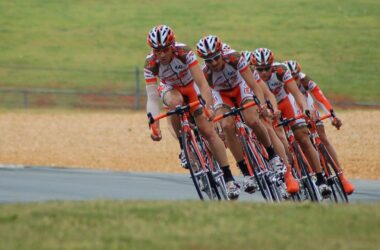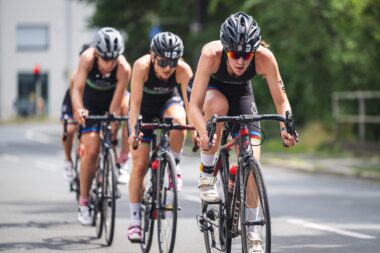The Importance of Recovery After Intense Cycling Races
After participating in intense cycling races, athletes often overlook the importance of recovery. Recovery involves not just resting your body but also engaging in nutritional and mental practices that ensure future performance improvements. Neglecting recovery can lead to overtraining, injuries, and diminished performance levels over time. Research indicates that recovery is essential for muscle repair and regeneration. Incorporating strategies such as hydration, balanced nutrition, and active recovery sessions can significantly enhance recovery outcomes. Adequate sleep is also vital as it promotes muscle repair and restores energy levels. Consuming a mix of carbohydrates and proteins soon after racing assists the body in replenishing glycogen stores effectively. Beyond just physical recovery, mental recovery plays an equally crucial role. Athletes need to unwind and reflect on their performances to reduce stress and anxiety. Moreover, finding ways to relax, such as yoga or meditation, can help the mind recover as well. Recovery is more than just resting; it is an essential part of a comprehensive training program for long-term success in cycling competitions. Understanding and prioritizing recovery methods can lead to improved athletic performance and resilience.
To optimize recovery, cyclists should consider multiple strategies. A structured recovery plan could include varying intensities in workouts and sufficient rest days. This thoughtful approach not only aids recovery but also prevents burnout. Utilizing foam rollers can help relieve muscle tension and enhance flexibility post-race. Additionally, massages are beneficial for reducing soreness and improving blood circulation. Another effective method includes contrast therapy, which alternates between hot and cold treatments to expedite recovery processes. Customized nutrition tailored for recovery can involve electrolyte-rich beverages post-exercise. These replenish lost minerals while supporting overall hydration. Eating antioxidant-rich foods can combat oxidative stress that accumulates during physical activity. In your recovery plan, incorporate low-impact exercises such as swimming or walking to reduce strain on the body while staying active. With proper planning, athletes can enjoy the benefits of enhanced performance and reduced risk of injury. As recovery integrates into a training cycle, it enhances overall endurance and strength in successive races. Ignoring recovery could ultimately hinder growth and improvement. Therefore, athletes must commit to their recovery strategies just as vigorously as they do to their training.
The Role of Nutrition in Recovery
Nutrition plays a pivotal role in a cyclist’s recovery protocol after intense races. Fueling the body with the right nutrients is essential for speedy recovery and optimal performance in subsequent races. Consuming a balanced mix of macronutrients, especially proteins and carbohydrates, aids in the speedy replenishment of energy stores. Carbohydrates are vital as they help restore glycogen levels which can be depleted during prolonged exertion. Conversely, proteins assist in repairing damaged muscle tissues. Athletes should aim for a recovery meal rich in these nutrients within 30 minutes post-race. Hydration should also be a priority; cycling depletes the body of essential fluids, necessitating appropriate intake of water or electrolyte-rich drinks. Just as critical is the inclusion of vitamins and minerals in an athlete’s diet, which supports various bodily functions. Foods high in omega-3 fatty acids and antioxidants are particularly valuable for reducing inflammation. Moreover, some athletes benefit from supplements that can specifically target their recovery needs. Tailoring nutritional intake post-race can elevate recovery routines, leading to improved performance metrics in future competitions. Seeking the guidance of a nutritionist can optimize dietary plans effectively.
Recovery also includes staying mindful of the mental aspects associated with cycling competitions. Both physical and mental rest are crucial for maximizing performance capabilities. Post-race, athletes might experience intense emotional rollercoasters—whether from elation or disappointment. It’s vital to process these emotions constructively, allowing for effective learning from each experience. Engaging in reflective practices not only improves mental clarity but also prepares athletes for their next challenge. Journaling can serve as a valuable tool for this purpose, enabling cyclists to document their thoughts and feelings. Moreover, integrating laughter, social interactions, and activities that bring joy facilitates emotional recovery. Partaking in light-hearted conversations or humorous pursuits shifts focus away from racing and allows mental relaxation. Mindfulness techniques can also aid in centering and calming the mind. Visualization, where athletes mentally rehearse future challenges, builds confidence and allows better performance through conditioning. Overall, taking time to recover mentally is just as necessary. Athletes should establish a well-rounded recovery routine, combining physical, nutritional, and psychological strategies to reach peak performance in cycling.
Injury Prevention and Recovery
Proper recovery reduces the risk of injuries that often plague cyclists after intense races. Overuse injuries can occur with inadequate recovery strategies, leading to extended periods of inactivity. One way to prevent injuries is by closely monitoring training loads and incorporating rest days into the schedule. This helps mitigate the risk of conditions like tendonitis or bursitis. Cross-training during recovery periods can also benefit athletes by improving overall fitness while reducing repetitive strain caused by cycling alone. Incorporating exercises off the bike strengthens stabilizing muscles, enhancing overall performance. Additionally, cycling posture plays a significant role in injury prevention. Cyclists should ensure their bikes are properly fitted to avoid issues arising from improper alignment. Engaging in strength training and flexibility work further adds to injury prevention strategies. Such routines create a more resilient body capable of handling intense workloads. Moreover, adhering to a gradual return to full intensity post-race is crucial. Cyclists must recognize their limits on recovery days. Continuous self-assessment and adjusting training loads can effectively minimize injury risks. Ultimately, prioritizing recovery as a foundation will result in longevity in the sport while enabling consistent improvements.
It is equally essential to create an effective post-cycling race recovery environment. This can range from the choice of post-race activities to the recovery tools used. An optimal recovery environment seems to foster physical and mental healing. For instance, finding a comfortable spot to unwind after a race can contribute to relaxation. Incorporating recovery aids, such as compression garments and massage tools, can further enhance recovery efforts. Cyclists can explore technologies designed to support recovery, including tools that promote blood flow and reduce soreness. It’s also wise to seek support from teammates or coaches who can provide positive reinforcement during recovery phases. Collaborating to share experiences can foster community and create opportunities for growth. Regularly incorporating low-stress activities, such as leisure rides or easy walking, can nurture recovery seamlessly. Consider scheduling recovery times into the training calendar, with specific days dedicated to recovery practices. By viewing recovery as a priority, cyclists empower themselves to achieve more in future races. This intentional approach toward post-race recovery ensures sustained improvement, not just physically but also mentally.
Long-term Benefits of Effective Recovery
Lastly, understanding the long-term benefits associated with effective recovery practices is crucial for extending cycling careers. Athletes who prioritize recovery often experience better overall performance outcomes throughout their competitive years. Consistent recovery practices lead to enhanced strength, improved endurance, and heightened mental resilience. Investing in recovery can also help you maintain motivation and enthusiasm for cycling competitions over time. Athletes may find that they achieve new personal records after establishing solid recovery routines. Over the long run, solid recovery practices contribute to injury prevention and mental well-being. This promotes a healthier attitude toward the sport. Furthermore, insights gained through effective recovery aid in developing robust training plans tailored to individual needs, fueling progress. Ultimately, this holistic commitment influences the longevity of cycling, paving the way for gradual improvements. As athletes engage with racing seasons year after year, their investment in recovery becomes the bedrock of their cycling journey. It’s essential not to overlook these practices. Emphasizing recovery methods significantly impacts performances, creating a sustainable cycling experience that champions athleticism and fulfillment.
In conclusion, athletes must integrate recovery into their overall cycling strategy. Embracing recovery yields significant physical and mental benefits that enhance race performances. Developing personalized recovery plans enriches the athletic journey, helping cyclists hone their skills while minimizing injury risks. By leveraging nutrition, mental health practices, and effective strategies, cyclists not only improve their performance but also deepen their enjoyment of the sport. Recovery is not merely an afterthought; it is a crucial aspect that deserves attention and prioritization. Establishing a culture that values recovery will lead to happier and healthier athletes. Cyclists who invest effort into their recovery are more likely to achieve their long-term goals. The journey of a cyclist is one of continual learning and development, and recovery assures that passion burns brightly. By creating a more informed cycling community that understands these principles, athletes serve themselves better. A comprehensive approach enables the fullest potential of any cycling competitor to blossom. Whether you’re a seasoned cyclist or just starting, finding a recovery balance is indispensable. These strategies discussed can lay the foundation for a long and successful cycling career.








